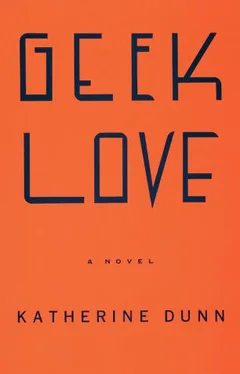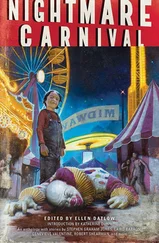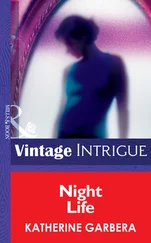The guard, in embarrassment at my rigid body in his arms, was jabbering, “Sorry, Arty, I brought the lady to your ramp, like always, and I’d just got to the other end of the van when the ruckus started.”
“Take Oly back to her door, Joe. Goodnight.” The door slammed shut.
“Jeez, Miss Oly,” said my guard. He turned, opened the door to the family van, put me down just inside, and closed the door on my ice-struck face. I crawled into my cupboard and tried to swallow my tongue or hold my breath long enough to die. I hoped they might give me a half-pint urn and bolt me onto the hood of the generator truck behind Grandpa.
Chick would come to rest his cheek on my cool metal when he was sad. Mama would polish me every morning before she went to the Chute and blink away tears remembering my sweet smile. Then it occurred to me that they might put me in the Chute in the biggest jar of all and I’d float naked in formaldehyde and the twins would bicker over who had to shine my jar. I gave up on dying and went over to blubbering into my blanket instead — imagining razor-slash scenarios of what Arty was doing with the norm girl and what an asshole I was. I went on blubbering until I slept.
I kept the norm girl at Arty’s door to myself. Arty wouldn’t talk about it. He liked secrets. Without a good reason, Arty wouldn’t admit that he ate or slept. Information was a marketable commodity to Arty. The guard may have gossiped but he would try to keep Papa from hearing about it. Private arrangements with Mr. Arty didn’t get to Al if a man wanted to keep his job.
I hung on to it — my embarrassment at being an idiot and my shame at being a patsy. Idiot for jumping a guest while in the throes of melodramatic fancy, patsy for being pulped by pain at Arty’s involvement with a girl, and a norm at that.
I crept out of my cupboard and peeped through the slats of the louvered window in our door. I couldn’t see much, but several nights of quivering in my flannel nightie in the dark proved it wasn’t an isolated incident.
The girl I’d tackled was a stranger, not part of the show. I heard and saw Arty’s door open and blurred figures moving into the light several times before I recognized that it was always a different girl.
I crawled into my blankets smiling, slept well for the first time in days, woke as cheery as a pinhead, went joking and grinning around all day. Arty wasn’t having a love affair. He was just “fucking around,” as the redheads called it. What had been a blowtorch blackening my brain with sick, helpless jealousy was now just useful information. A love affair would have shut me out. This gave me an opening. I could tease Arty in private. Keeping mum to everybody else would be evidence of my discretion and encourage him to have confidence in me. If a trickle of puke still riled my throat at the thought of Arty with the long-limbed norms, it was at least tolerable. I needed all the ammo I could get.
Zephir McGurk was a do-it-yourself electrician from the same independent school of thought that spawned Papa’s medical hobby. McGurk made do. He read journals and magazines and catalogues from supply houses to feed his ingenuity, but he was an innovator. Even if a thing had been invented and perfected thirty years before, McGurk was inclined to build his own rather than buy the gimmick from somebody else. McGurk was valuable. His pay was minimal cash and what Arty called the “overflow” of curious females.
He slept in the back of the old but well-kept safari car. He did his work in the utility trailer that housed the power tools and spare parts. He set up a compact and efficient workshop. If he wasn’t in the workshop he was asleep or in Arty’s show tent. He never socialized in the midway or dropped in on any other act. Zephir was a focused man. Arty was his apple. Arty was the work he’d been given to do.
“It would be good to have some way to spell out my messages in lights,” Arty might say.
“Maybe,” McGurk would say slowly, his head already tumbling possibilities.
Arty went to visit him in the workshop. This flattered McGurk deeply. If Arty was in an energetic mood he’d have me strap him into one of his treads and would lead the way to the workshop with me trailing. He’d go up the step and climb up on the workbench and talk companionably with McGurk.
Other times he’d stay in his chair and sit outside the door with McGurk perched on the step to talk. McGurk had stowed his prosthetic legs in a trunk. He’d gone over to fancy strap-on pads on his thigh stumps. He wore blue or brown leather for his workaday stumps, but he got a pair made of iridescent green satin, embroidered with silver vines, for wearing in the control booth at the top of the bleachers where he worked the sound-and-light board for Arty’s show.
It was McGurk who invented Arty’s speaking tube — a plastic form that fitted over Arty’s nose and mouth. When Arty tongued the button inside, a rush of air expelled the water from the face mask so Arty could breathe and talk into the mask at the same time. The thing stuck up against the front plate of the tank on a long gooseneck that linked it to a gaudy (but phony) console in the bottom of the tank. It actually hooked into the sound system. Arty talking under water was an astonishing improvement over propping his chin on the top of the tank to rap into the microphone. The crowd loved it.
When McGurk built the button receiver that hid in Arty’s ear and let him hear the sound system, the crowd, and messages from McGurk in the control booth, Arty offered the electrician his own van and a good raise. McGurk shook his tidy head and politely turned it all down. “I’ve got my routine set,” he said. He went on sleeping in his station wagon.
McGurk cooked for himself. He was a fussy vegetarian. He was roasting carrots in an oven in the workshop the day he came up with what we later called “The Singing Buttock.” He was peering through the oven window at the sliced carrots in a dish. “What if,” he asked, “every board in the bleachers was wired for sound?”
Arty was lolling on top of the workbench looking at a sheet of McGurk’s doodles for a new colored-light plan. He rolled back his head and squinted at McGurk’s broad shoulders. McGurk with his back to you was an imposing specimen even with his shirt on. The oven pinged and he took the dish out with a mitt.
“Why?” Arty wanted to know. McGurk dropped the mitt beside the carrots and leaned his big brown elbows on the workbench. He had his private knife and fork wheeling through the carrots and whipping quick chunks of steaming root into his mouth. He always ate standing up. Three bites went through methodical milling and swallowing before he finally let his eyes drift up to Arty.
“Sound is physical. I’ve been watching Miss Oly …” He nodded to where I perched on his work stool. “Her ticket talking got me thinking. Sound is a vibration. It carries through matter. When you hear, it’s not just with your ears. A sound actually affects every cell of your body, making it vibrate and pass that vibration to all your other cells. That’s why they say a sound is ‘piercing’ or a scream ‘goes right through you.’ It does. It actually does.” He stopped with his fork in midair and looked at Arty. Arty was watching him, waiting. Arty didn’t say anything. McGurk sighed and took a piece of carrot from the fork and chewed it. I watched it go down his thick-muscled gullet.
“I was thinking,” McGurk said, finally, “that you use your voice real well. I was thinking, what if your voice wasn’t just coming at ’em from the air but was vibrating up from the soles of their feet and through their asses up their spines. I was thinking what it would be like if they felt what you had to say because the boards they were standing and sitting on were wired to carry that vibration of your voice.”
Читать дальше












